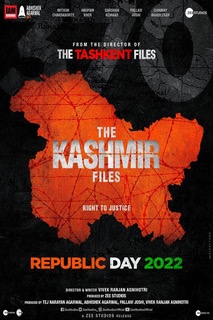Vitarka Atma Jnanam – Unwavering Awareness is Knowledge of SELF. Siva Sutras 1.17
Legend has it that Lord Siva himself revealed Siva Sutras to Vasugupta at the Mahadev Mountain that stands above the current day Shalimar Gardens in Srinagar. It is said that the words of Siva are etched on the mountain wall and of course they are not visible to us. How can they be perceptible to an awareness in constant fluctuation that is clothed in falsehood? Kashmir gets its name from Sage Kashyap – father of both the Devas and Asuras – and so the land appears to be the site of perennial Devasur Sangram. But humans must rise towards Unwavering Awareness to restore Truth and stop brutality. The making of Kashmir Files by Vivek Ranjan Agnihotri is one such attempt to uncover the truth about Hindu genocide – something that has been happening steadily – often with grave severity and occasionally in an unnoticeable manner for centuries. However, the film’s focus is on what has been happening in the last 32 years.
In this review, I want to draw attention to how Vivek Agnihotri carefully and skillfully disambiguates the existing narratives on Kashmir circulating worldwide. There is no room for ambiguities and multiple meanings when we talk about cultural genocide. Understandably and justifiably, it must be single-voiced because we are not talking about two warring factions in conflict; we are dealing with ruthless massacres. The destructive elements dispatched mainly from neighboring Pakistan with tacit support from western nations, in collaboration with wicked players in the Valley have been on a full-scale frontal attack with some Asuric strength and determination to wipe out Truth, Knowledge, Art and Culture and coronate themselves as the undisputed emperors of the region. The film depicts that demonic force, and their charging war cry is this slogan – Raliv, Galiv ya Chaliv… (Convert, Die, or Leave). When we hear this in the film repeatedly it is both chilling and numbing. This is how ethnic cleansing has been and continues to be carried out.
The only character wrestling with multiple voices – almost like an individual with psychosis – is the protagonist Krishna, played brilliantly by Darshan Kumar. The truth about the events in his life – father slaughtered in a rice drum, brother Siva shot dead, and mother Sharada vivisected publicly by terrorists dressed in Indian army outfits – were withheld from the growing Krishna. But when he comes to know bits and pieces of the truth, he finds comfort in alternate untruths – that they died in an accident or even worse that they deserved to be killed. Krishna was raised by his grandfather, superbly played by none other than Anupam Kher. Even with dementia taking over, the ageing grandfather communicates to Krishna the value of finding and facing truth. Recognizing that Krishna is deluded by lies hurled at him, the retired government official and a friend of the family angrily throws the Kashmir files that he has diligently compiled over the years on Krishna’s face and implores him to face the truth. As a helpless witness to horrific events, this character played by the versatile Mithun Chakraborty shows what a tormented soul looks like, a combination of Bhishma and Vidur.
The wise and kind words of the grandfather and the facts revealed by the elderly family friend pale before the force of brainwashing machinery that Krishna must deal with. There are the usual suspects; the media advancing false narratives, and the militants complaining that they are victims of the heavy handedness of Indian government and military. But the most vicious of all is the college professor – Radhika Menon – played by Pallavi Joshi with remarkable skill. This educator is more vile and cunning than Mama Shakuni of the Mahabharata– grooming students to become revolutionaries to overthrow the state. She is the quintessential Urban Naxal that Agnihotri has been exposing and fighting over the years.
Vivek Agnihotri shows to the viewers the massive trauma like head injury to Mother India and with that comes an unstated warning; failure to treat and heal the wound could easily cripple and paralyze other parts of Bharat Mata. The characters in the film do not come across as mechanical mouthpieces for Agnihotri to shove his opinions down our throat; instead, the characters played by Mithun Chakraborty, Anupam Kher, Prakash Belawadi, Pallavi Joshi and others are presented as individuals in their own right with their independent voice intact. And that is a mark of great artistry.
Towards the end of the film when we witness Krishna’s mother Sharada being dismembered in public by a saw, while she continues screaming Om Namah Sivaya as she makes her way to Shiva Lok, the scene shatters our complacency and the mental blocks of Hindus to facing harsh reality.
Kashmir is an important abode of Lord Shiva. In ancient India, Kashmir was the Seat of Learning – Kasmiretu Saraswati – it was the cradle of civilization. Best philosophies on Language, Theater, Mind, Body, Laughter and Satire and much more came from the school of Kashmir Saivism. Besides, many towns in this region find mention in Shiv Purana. When Shiva wanted to reveal a Cosmic Secret to Devi Parvati in the caves of Amarnath, he left behind Nandi in Pahalgam and the serpents in Anant Nag and Chandra Dev in Chandanwari and so on. More importantly, Kashmir is also Devi Bhoomi ( Land of the Goddess)– the ruins of Sharada Peeth in POK are a Shakti Peeth where Devi Sati’s right hand is said to have fallen. Near the caves of Amarnath, it is believed that Devi Sati’s throat fell and hence a Shakti Peeth.
With these Puranic stories in mind, I think there is a deep and subtle message in the cries of Om Namah Sivaya, from Goddess Sharada herself to us – DO NOT FORSAKE TRUTH. As I restlessly pondered over the character Sharada’s prayer, I wondered what she might be seeking from Lord Shiva. A beautiful film song composed by a Telugu poet, Sirivennala Sitarama Sastry came to my mind – Aadi Bhikshuvu Vadini Yedi Koredhi…What can I seek from The Primeval Beggar…? Yes, the poet is right. What can you seek from a Beggar? All you can do is offer something. Perhaps from the caves of Amarnath, The Primeval Beggar is extending his Divine Begging Bowl. Vivek Agnihotri, along with his talented team have offered their effort in giving Punarjanma to Satya and the rest of us could perhaps offer our heightened and Unwavering Awareness of Truth.

